- Home
- Conn Iggulden
Ravenspur: Rise of the Tudors
Ravenspur: Rise of the Tudors Read online
Conn Iggulden
* * *
WARS OF THE ROSES
Ravenspur: Rise of the Tudors
Contents
Map and Family Trees
List of Characters
The Road to This Place
PART ONE
Chapter 1
Chapter 2
Chapter 3
Chapter 4
Chapter 5
Chapter 6
Chapter 7
Chapter 8
Chapter 9
Chapter 10
Chapter 11
Chapter 12
Chapter 13
Chapter 14
Chapter 15
Chapter 16
Chapter 17
Chapter 18
Chapter 19
Chapter 20
Chapter 21
Chapter 22
Chapter 23
PART TWO
Chapter 24
Chapter 25
Chapter 26
Chapter 27
Chapter 28
Chapter 29
Chapter 30
Chapter 31
Chapter 32
Chapter 33
Epilogue
Historical Note
Acknowledgements
Follow Penguin
Also by Conn Iggulden
THE WARS OF THE ROSES SERIES
Stormbird
Trinity
Bloodline
THE EMPEROR SERIES
The Gates of Rome
The Death of Kings
The Field of Swords
The Gods of War
The Blood of Gods
THE CONQUEROR SERIES
Wolf of the Plains
Lords of the Bow
Bones of the Hills
Empire of Silver
Conqueror
Blackwater
Quantum of Tweed
BY CONN IGGULDEN AND HAL IGGULDEN
The Dangerous Book for Boys
The Pocket Dangerous Book for Boys: Things to Do
The Pocket Dangerous Book for Boys: Things to Know
The Dangerous Book for Boys Yearbook
BY CONN IGGULDEN AND DAVID IGGULDEN
The Dangerous Book of Heroes
BY CONN IGGULDEN AND ILLUSTRATED BY LIZZY DUNCAN
Tollins: Explosive Tales for Children
Tollins 2: Dynamite Tales
To my mother
Map and Family Trees
England at the time of the Wars of the Roses
Family Trees
Royal Lines of England
House of Lancaster
House of York
House of Neville
House of Tudor
List of Characters
– Queen Margaret/Margaret of Anjou: Wife of Henry VI, daughter
of René of Anjou
– Lady Margaret Beaufort: Great-granddaughter of John of Gaunt, mother of Henry Tudor
– Thomas Bourchier: Archbishop of Canterbury
– Derry Brewer: Spymaster of Henry VI and Queen Margaret
– Henry Stafford, Duke of Buckingham: Supporter of Richard, Duke of Gloucester
– Charles le Téméraire (the Bold), Duke of Burgundy: Enemy of King Louis XI, and backer of Edward IV
– George, Duke of Clarence: Brother of Edward IV and Richard, Duke of Gloucester
– John Courtenay, Earl of Devon: Supporter of Queen Margaret and the Prince of Wales at battle of Tewkesbury
– Edward IV: King of England, son of Richard Plantagenet, Duke of York
– Edward V: Elder son of Edward IV, one of the princes in the Tower
– Henry Holland, Duke of Exeter: Supporter of Henry VI and Queen Margaret
– Richard of Gloucester: Brother of Edward IV and George, Duke of Clarence, later King Richard III
– Lord Baron William Hastings: Lord Chamberlain to Edward IV
– Henry VI: King of England, son of Henry V
– Edward of Lancaster: Son of Henry VI and Queen Margaret, Prince of Wales
– Louis XI: King of France, cousin of Queen Margaret
– Jacquetta of Luxembourg: Mother of Elizabeth Woodville
– John Neville, Baron/Marquess Montagu: Brother of Earl Warwick
– John Morton: Bishop of Ely
– Ann Neville: Daughter of Earl Warwick, wife of Edward of Lancaster, then of Richard of Gloucester
– George Neville: Archbishop of York, brother of Earl Warwick
– Isabel Neville: Daughter of Earl Warwick, wife of George, Duke of Clarence
– John de Mowbray, Duke of Norfolk: Supporter of Edward IV and Richard III, formerly supporter of Henry VI
– Henry Percy, Earl of Northumberland: Head of Percy family, reluctant supporter of Richard III, formerly a supporter of Henry VI
– John de Vere, Earl of Oxford: Supporter of Henry VI and Queen Margaret, and later of Henry Tudor
– William Herbert, Earl of Pembroke: Guardian of Henry Tudor in Pembroke Castle
– Anthony Woodville, Earl Rivers: Brother-in-law to Edward IV
– Edmund Beaufort, Duke of Somerset: Supporter of Queen Margaret and Edward of Lancaster
– Lord Thomas Stanley: Royal treasurer and stepfather to Henry Tudor
– Sir William Stanley: Brother of Lord Stanley and captain to Lord Hastings; fought with Edward IV, and later Henry Tudor
– Robert Stillington: Bishop of Bath and Wells
– Rhys ap Thomas: Welsh captain, supporter of Henry Tudor at Battle of Bosworth
– Edmund Tudor: Husband of Margaret Beaufort and father of Henry Tudor; died of the plague in 1456
– Jasper Tudor: Brother of Edmund Tudor, uncle of Henry Tudor
– Owen Tudor: Father of Edmund and Jasper Tudor; killed after Battle of Mortimer’s Cross
– Richard Neville, Earl of Warwick: Head of the Neville family after the death of the Earl of Salisbury, later known as the Kingmaker; formerly supporter of Edward IV, restored Henry VI to the throne
– Baron Wenlock: Supporter of Margaret and the Prince of Wales
– Elizabeth Woodville: Wife of Edward IV
– Earl of Worcester: Supporter of Edward IV and Constable of England
– Anne, Bridget, Catherine, Cecily, Mary and Elizabeth of York: Daughters of Edward IV and Elizabeth Woodville
– Richard of Shrewsbury, Duke of York: Younger son of Edward IV, one of the princes in the Tower
The Road to This Place
In the fifteenth century, two great houses of England were bound by blood. The older line, Lancaster, held the throne for three generations – until King Henry VI fell ill. The lesser line, York, snatched up the reins then – and war followed.
There could not be two kings. Edward of York joined with Earl Warwick to settle the issue on the battlefield in 1461. The house of Lancaster was defeated. Queen Margaret fled to France with her son, leaving her husband, Henry, to be held in the Tower of London.
King Edward IV married Elizabeth Woodville, who turned him against Earl Warwick. After endless provocations, Warwick snapped and captured Edward, holding him prisoner. Warwick also allowed the king’s brother, George, Duke of Clarence, to marry his daughter.
Though Warwick freed Edward in the end, their friendship never recovered. Edward acted on accusations of treason against Warwick, sending men to arrest him.
At the end of the events in Bloodline, Warwick ran. He left England with his heavily pregnant daughter and his son-in-law, George of Clarence. Denied safe harbour, the child was born and died at sea. Warwick and Clarence were made exiles in France, rejected by friends and family.
The French king, Louis XI, saw a rare chance. He gave
Warwick and Clarence an army of mercenaries – and the ships to land them. They returned to the coast of England in September 1470. Leaves of gold and red and white had been swept up in a great gale, so that no one knew how they would land. The season of vengeance had begun.
1470
Trust not him that hath once broken faith.
William Shakespeare, Henry VI, Part Three
1
The river bent a tail around Pembroke Castle. Winter sun shone red against the walls and the keep rose above the rest, tall as a cathedral, and about as proud.
On the path by the gatehouse, the stranger rested his hands on his saddle pommel, rubbing a thumb along a line of broken stitching. His horse was tired, the animal’s head drooping as it found nothing to eat on stones. Compared to the guards staring down, Jasper Tudor was as dark as a shepherd. His hair was thick with road-dust, like matted cloth. It hung to his shoulders, keeping his face in shadow as the sun set and the day began to die around him. Though he was weary, his eyes were never still, watching every movement on the wall. Each time a guard turned his head to the inner yard, or glanced at an officer below, Jasper saw and listened and judged. He knew when news of his presence had summoned the master of the castle. He knew how many steps that man had to climb to reach the outer gate, barred in iron and just the first of a dozen defences against an attack.
Jasper counted under his breath, distracting himself from the anger he felt just at being in that place. He imagined each turn of the stone steps within and his mouth quirked when he saw William Herbert arrive on the crenellations. The young earl looked down at him, strong emotion making him mottled. The new master of Pembroke was just seventeen years old, a red-faced brawler, still reeling from the death of his father. It seemed Earl Herbert did not much like the sight of the dark and wiry man looking up at him. That much was clear from his expression and the way he gripped the stone with his thick hands.
Jasper Tudor had been the Earl of Pembroke once, a dozen years before. It was hard not to bristle when a man half his age looked down upon him in arrogance from his own walls.
Earl William Herbert merely stared for a time, his eyes pinched small as if he had swallowed something that irked him. The younger man had a wide head, not fat but broad, topped by sleek hair cut straight across. Under that gaze, Jasper Tudor inclined his head in greeting. It would have been hard enough to deal with the father, had the man lived.
The older Herbert had not died well, giving no new honours to his family line. He had not lost his life in some valiant action, but had been cut down without thought when Warwick had captured King Edward. That small loss, ignored at the time, had been eclipsed by the greater sin of Warwick laying hands on the king. In Pembroke, it had meant an entire town in mourning.
In the gathering gloom, Jasper Tudor swallowed nervously. Glints of light appeared and vanished in stone slots along the walls, as men in armour shifted their weight. He knew he had gained no advantage by spotting them. No one could outride a bolt.
Clouds drove across the sky, lit from beneath by the last of the sun. Above, the new earl lost patience at last with the silence. For all it cost him a slight advantage, for all his grief and dominance, there were not many seventeen-year-olds who could have matched the stone-like calm of a man at forty.
‘Well? What do you want here, Master Tudor?’ The young earl seemed to find some small pleasure in the lack of a noble title. Jasper Tudor was King Henry’s half-brother. He had been raised high by the house of Lancaster, and in return he had fought for them. He had taken the field against the eighteen-year-old Edward of York, the giant still weeping in rage for the death of his father. Jasper repressed a shudder at the memory of that monster in red armour, carmine as the sun on Pembroke walls.
‘I give you God’s good day and recommend me to you. I have sailed from France to this coast, running ahead of all news. Have you heard yet from London?’
‘Does it so stick in that Welsh throat to call me lord?’ William Herbert demanded. ‘I am the Earl of Pembroke, Master Tudor. If you’re at my gate to beg for food or coin, you will be disappointed. Keep your news. Your Lancaster mobs and your ragged, prisoner king have no claim on me. And my father gave his life in defence of the rightful king of England, Edward of York.’ The young man’s mouth turned up on one side, twisting his face. ‘While you, Tudor, I believe you were attainted, losing all honour, titles, property. I should have you struck down at this moment! Pembroke is mine. All that was my father’s, is mine.’
Jasper nodded as if he had perhaps heard a point worth considering. He saw bluster in the young man, covering weakness. Once more, he wished he could have dealt with the old earl, who had been a man of honour. Yet that was the way of it, when wars began. Good men died and left their sons to follow them, for better or worse. Jasper shook his head, swinging the clotted locks of his hair. He was one of those sons himself, perhaps a lesser man than his father, Owen. Worse, in the years of his exile, Jasper had found no wife nor made sons of his own. If the French king hadn’t granted him a stipend as his cousin, Jasper thought, there was a chance he would have starved to death, alone and penniless. Yet he had remained loyal, to King Henry, and to Queen Margaret of Anjou, in all her despair and her fall.
Jasper looked down for a moment, his hopes fading under the earl’s scorn. Yet he stood before Pembroke, and that old place had been his. It still rang with an aching familiarity and gave him some strange comfort just from being there, tempting him to reach out and touch the stone. He could not allow himself to be shamed in sight of those walls. He raised his head once more.
There was still one whom he loved within the fortress, as well as any father loved a son, and the real reason for his visit. Jasper Tudor had not come to Pembroke for accusations or vengeance. The tide of men’s affairs had called him home from France and he had asked permission of Warwick to take the time for a private errand. As the great fleet braved the open sea, his ship alone had set off into the west.
Jasper looked along the length of the battlements and saw no sign yet of his brother’s son, kept for fourteen years as a ward, or a prisoner.
‘I used to think Pembroke was a different world from all the busyness in London, all the doings and the trade,’ Jasper said, raising his voice to carry. ‘Two hard weeks on the road, with a string of horses. It can be done, but it is no easy task. And in the winter, the roads are such a quagmire, it is better to sail round the Cornish coast, though it takes at least as long and is more perilous. For myself, I fear those winter storms that can tear a ship’s hull open and drown all those who risk their lives on deep waters, God bless their souls.’
The words flowed from him, making the eyes of the earl grow glassy until the young man shook his head in confusion.
‘You will not enter here, Master Tudor,’ Earl Herbert snapped, losing the last threads of his patience. ‘Play no more of your Welsh games; I will not open my gate to you. Say what you have come to say and then go back to your damp woods and your camps and your poaching of hares. Live like the grubby, starving brigand you are, while I enjoy Pembroke and roast lamb and all the comforts of King Edward’s trust.’
Jasper rubbed his jaw with the back of his thumb to keep a flash of anger from showing. He loved Pembroke still, every stone and arch and hall and musty storeroom, filled with wine and grain and preserved haunches of sheep and goats. He had hunted the land all around and Pembroke was home to him in a way that had a greater claim than anywhere else in the world. It had been a dream as a child that he might one day own a fine lord’s castle. When it had actually come true, Jasper Tudor had been satisfied. There was no greater dream, not for the son of a soldier.
‘Whether you have heard or not, my lord, the tide is turned. Earl Warwick has come home with a fleet and an army.’ Jasper hesitated, searching for the right words. The young earl watching him had leaned right out on hearing that name, gripping the stones so hard it looked as if he wanted to break a piece off and hurl it at him. Jasper went on slo
wly, making the words fall far from the gatehouse.
‘They will restore Lancaster, my lord. They will lay a hot iron over the wounds, ending York. I speak not to threaten, but to give you the good word so that you may choose a side, perhaps before anyone asks again with a sword in their hands. Now, I have come for my nephew, my lord. For Henry Tudor, son of my brother Edmund and Margaret Beaufort. Is he well? Is he safe within?’
As the Earl of Pembroke opened his mouth to reply, Jasper saw movement along the wall at last, a white face, surrounded by thick black hair. The boy, surely, not yet with a man’s growth. Jasper gave no sign he had seen.
‘You have no claim on him,’ William Herbert snapped, showing his teeth. ‘My father paid a thousand pounds to gain a ward. I can see the ragged edge of your cloak, Tudor. I can see the grease and dust on you from here. Can you return that thousand pounds to me?’ The young man’s sneering grin vanished as Jasper Tudor reached behind him to a parcel of canvas and leather strapped to the small of his back. He pulled it out and shook it to jingle the gold coins within.
‘I can,’ he said, though there was no triumph in his voice. He could see the scorn in the earl and he knew it would not matter.
‘Oh yes? Do you also have …’ William Herbert’s mouth worked as if some thick clot of rage had closed his throat ‘… the years spent on his training in that bag of yours? Do you have my father’s time? His trust?’ The words spilled out faster, his confidence returning. ‘It looks too small for all of that, Tudor.’
The young earl’s will would prevail, no matter what was said, or who had the better of the exchange. One man could not force the door of Pembroke. Ten thousand could not.
With a sigh, Jasper shoved the pack out of sight once more. At least the French king would not own him once he had returned the loan. He rubbed his forehead as if in tiredness, hiding his eyes from the man thirty feet above him so he could flicker a glance at his nephew. Jasper did not want the boy seen and sent away. If he addressed him directly, he sensed enough spite in William Herbert to make his nephew’s life a misery, or even put it in peril. When Jasper spoke again, it was as much for the ears of Henry Tudor as it was to the new earl in Pembroke.

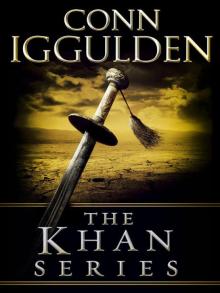 The Khan Series 5-Book Bundle
The Khan Series 5-Book Bundle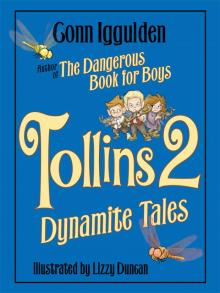 Tollins 2: Dynamite Tales
Tollins 2: Dynamite Tales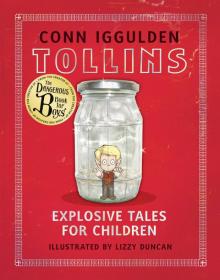 Tollins: Explosive Tales for Children
Tollins: Explosive Tales for Children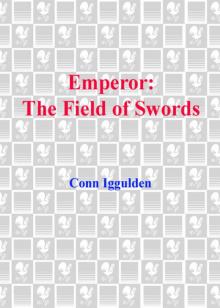 The Field of Swords
The Field of Swords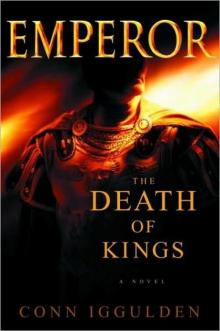 The Death of Kings
The Death of Kings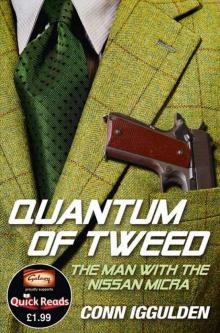 Quantum of Tweed: The Man With the Nissan Micra
Quantum of Tweed: The Man With the Nissan Micra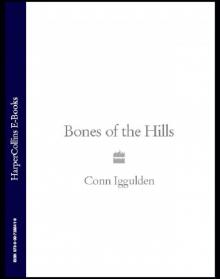 Bones of the Hills
Bones of the Hills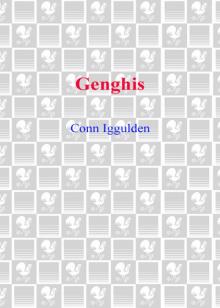 Genghis: Birth of an Empire
Genghis: Birth of an Empire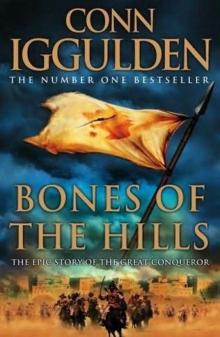 The Gates of Rome
The Gates of Rome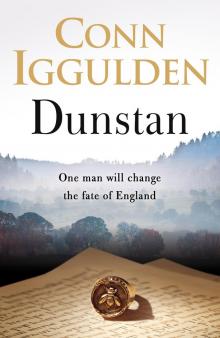 Dunstan
Dunstan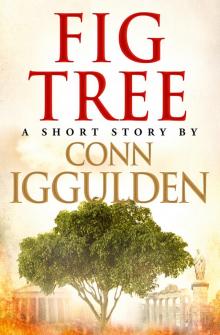 Fig Tree
Fig Tree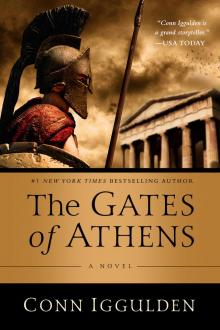 The Gates of Athens
The Gates of Athens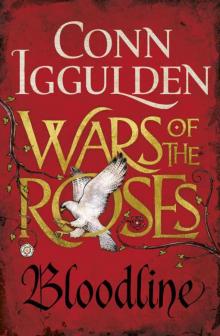 Stormbird
Stormbird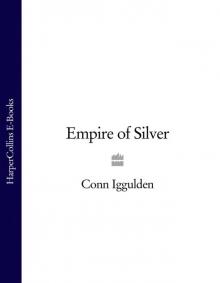 Khan: Empire of Silver
Khan: Empire of Silver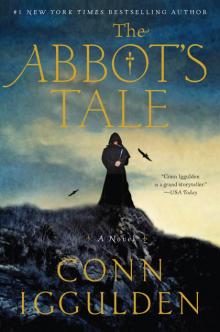 The Abbot's Tale
The Abbot's Tale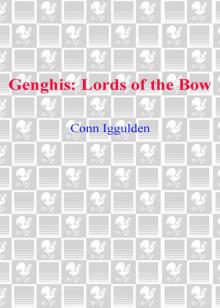 Gengis: Lords of the Bow
Gengis: Lords of the Bow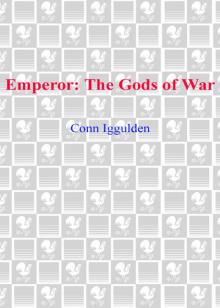 The Gods of War
The Gods of War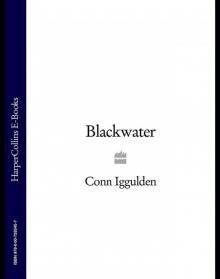 Blackwater
Blackwater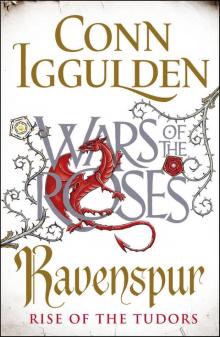 Ravenspur: Rise of the Tudors
Ravenspur: Rise of the Tudors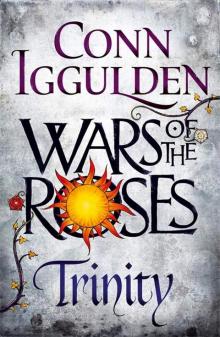 Wars of the Roses: Trinity (War of the Roses Book 2)
Wars of the Roses: Trinity (War of the Roses Book 2)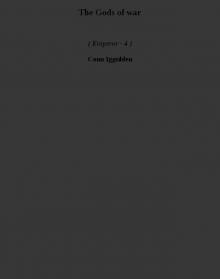 The Gods of war e-4
The Gods of war e-4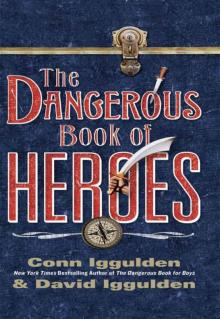 The Dangerous Book of Heroes
The Dangerous Book of Heroes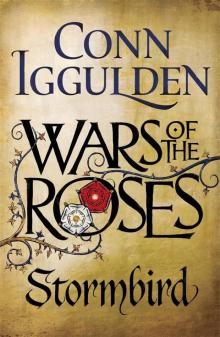 Stormbird wotr-1
Stormbird wotr-1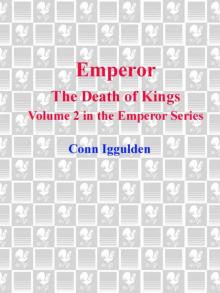 Emperor: The Death of Kings
Emperor: The Death of Kings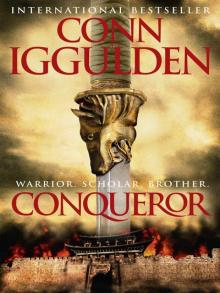 Conqueror (2011) c-5
Conqueror (2011) c-5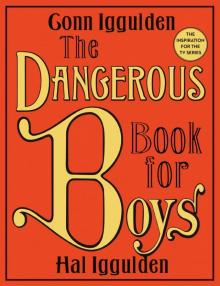 The Dangerous Book for Boys
The Dangerous Book for Boys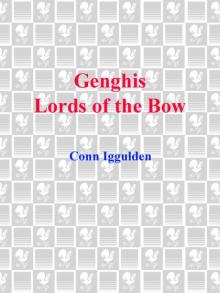 Genghis Lords of the Bow
Genghis Lords of the Bow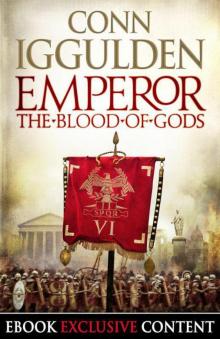 Emperor: The Blood of Gods (Special Edition) (Emperor Series, Book 5)
Emperor: The Blood of Gods (Special Edition) (Emperor Series, Book 5)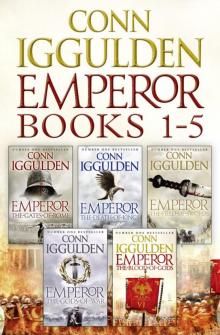 The Emperor Series: Books 1-5
The Emperor Series: Books 1-5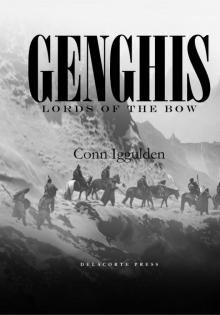 Lords of the Bow c-2
Lords of the Bow c-2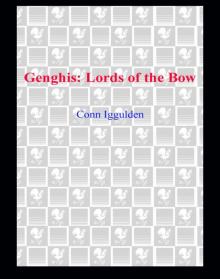 Lords of the Bow
Lords of the Bow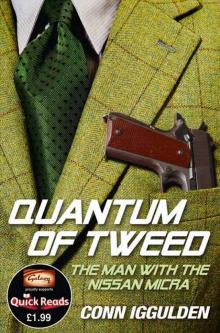 Quantum of Tweed
Quantum of Tweed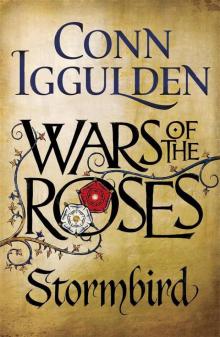 Wars of the Roses 01 - Stormbird
Wars of the Roses 01 - Stormbird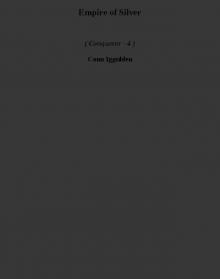 Empire of Silver c-4
Empire of Silver c-4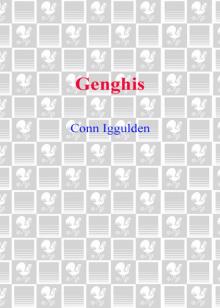 Birth of an Empire
Birth of an Empire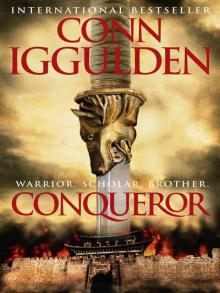 Conqueror (2011)
Conqueror (2011)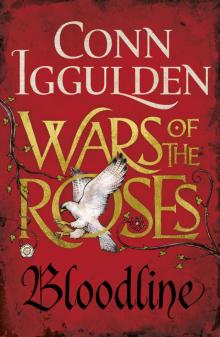 Wars of the Roses: Bloodline: Book 3 (The Wars of the Roses)
Wars of the Roses: Bloodline: Book 3 (The Wars of the Roses)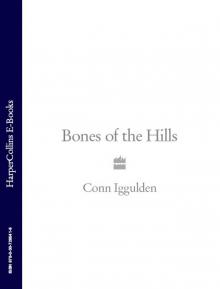 Bones Of the Hills c-3
Bones Of the Hills c-3 Empire of Silver
Empire of Silver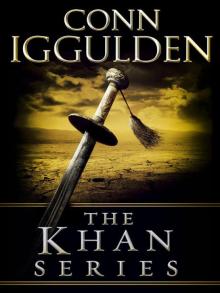 The Khan Series 5-Book Bundle: Genghis: Birth of an Empire, Genghis: Bones of the Hills, Genghis: Lords of the Bow, Khan: Empire of Silver, Conqueror
The Khan Series 5-Book Bundle: Genghis: Birth of an Empire, Genghis: Bones of the Hills, Genghis: Lords of the Bow, Khan: Empire of Silver, Conqueror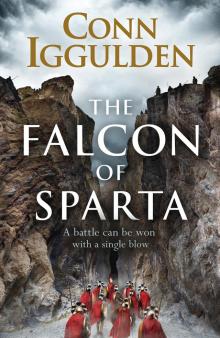 The Falcon of Sparta
The Falcon of Sparta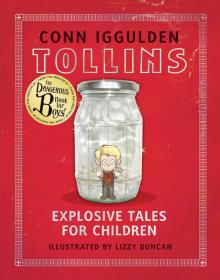 Explosive Tales for Children
Explosive Tales for Children